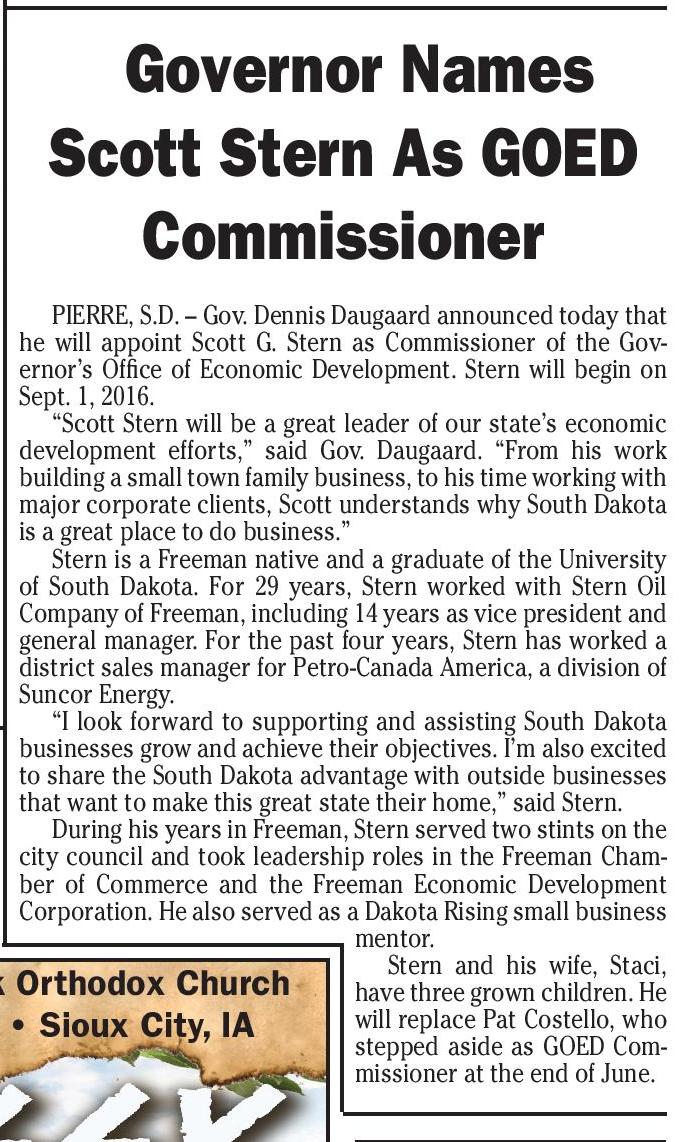2









2 Broadcaster Press
July 26, 2016 www.broadcasteronline.com
Parking Plots
Dave Says
Stay the Course
Dear Dave,
Our daughter is a special needs child,
who doctors say will live about half as
long as the average adult. There’s also a
good chance she will be under our care
her entire life. We just finished Baby Step
3 of your plan, so we have all of our debt
paid off except for the house, and we have
an emergency fund of three to six months
of expenses saved. We have health insurance, too. However, we were wondering
how the situation with our little girl affects
retirement planning and college funding?
Jonathan
Dear Jonathan,
I know this may sound strange, but the
situation with your daughter really doesn’t
affect things all that much. The only real
difference is that it sounds like you’ll be responsible for your sweet daughter for the
foreseeable future — not just until she’s 18
or 21.
If you don’t already have it, you and
your wife should both buy 10 to 12 times
your annual incomes in term life insurance. Make sure the money from the policies is set up to go into a special needs
trust that would be managed for her care.
That way, your baby will be taken care of
in the event something unexpected happens to you.
Otherwise, just keep following my
plan. Baby Step 4 means you start putting
15 percent of your income into pre-tax
retirement plans, like Roth IRAs and mutual funds. Baby Step 5 is college funding,
if that’s a consideration for her, followed by paying off
your home early.
Then, of course, the
last Baby Step is
building wealth and
giving.
Financially
speaking,
you’re
looking at filling a
need in the event
Dave
of your deaths. This
should be covered
by life insurance or
investments. If you reach a point where
your investments are substantial, and
money from those things can adequately
cover her needs and the needs of your
family, then you can always drop the insurance policies.
God bless you all, Jonathan.
—Dave
RAMSEY
Time to raise prices?
Dear Dave,
My husband has his own one-man
painting business, and I help him with the
books. We were wondering how you know
when it’s time to implement a price increase. Also, what should the increase be?
Lauren
Dear Lauren,
I grew up in the real estate business, so
I’ll use the apartment-complex model as
By Daris Howard
my example. If your building is completely
full, then it’s time to raise prices a little
bit until you have a vacancy. In this type
of scenario, you want a healthy level of
vacancy, meaning you’re always going to
be losing some customers as you go up in
prices.
In your husband’s case, if he’s booked
through the end of the month, he’s way
underpriced. Just keep on turning in your
bids, and don’t make a big deal about
things. It isn’t like a tenant, in your case,
where you’re going back time and time
again except in rare cases. You might start
with a 10 percent increase, and see what
happens for a while. If that goes well, wait
a bit and raise them another 10 percent.
There are only so many hours in a day
this guy can work, so the only other option is to take on staff. But before I start
staffing, I’m going to raise prices and cut
the number of customers that way. In most
cases with the construction business, if
you show up when you say you will, complete the job when you say you will, and
you do high quality work, there’s almost
no ceiling on what you can make!
—Dave
* Dave Ramsey is America’s trusted
voice on money and business, and CEO of
Ramsey Solutions. He has authored seven best-selling books. The Dave Ramsey
Show is heard by more than 11 million listeners each week on more than 550 radio
stations and digital outlets. Follow Dave
on Twitter at @DaveRamsey and on the
web at daveramsey.com.
CDC Awards South Dakota
$382,000 To Help Battle Zika
The Centers for Disease
Control and Prevention
(CDC) will award $382,000 to
South Dakota to fight the Zika
virus. The award is South
Dakota’s share of about $60
million CDC is awarding to
states, cities, and territories
to support efforts to protect
Americans from Zika virus
disease and adverse health
outcomes that can result
from Zika infection, including
the serious birth defect microcephaly.
The funding is in addition to
$25 million awarded on July
1 as part of CDC’s preparedness and response funding
to states, cities, and territories in areas at risk for outbreaks of Zika. On August 1,
CDC also will award another
$10 million to quickly identify cases of microcephaly
and other adverse birth outcomes linked to Zika and to
refer affected infants and
families to services.
The Obama Administration
has requested $1.9 billion
that public health experts
identified as necessary to
combat Zika and protect the
homeland, but the budget
has not been approved by
Congress.
“Our local, state and territorial health departments
are on the front lines in the
fight against Zika, and though
the necessary funding that is
needed isn’t yet available, we
cannot wait to provide this
essential support,” said CDC
Director Tom Frieden, M.D.,
M.P.H. "These CDC funds will
strengthen state and territorial capacity to respond to
Zika virus, an increasingly
concerning public health
threat.”
The new funding will support activities to protect
the health of the American
public, especially pregnant
women, through epidemiologic surveillance and investigation, strengthening
laboratory capacity, and
improving mosquito control
and monitoring. It will also
support participation in the
U.S. Zika Pregnancy Registry
to monitor pregnant women
with Zika and their infants, as
well as Zika-related activities
in U.S.-Mexico border states.
However, additional support
will be needed to help expand
mosquito control capabilities
and develop a Zika vaccine
and diagnostics, among other
priorities.
Zika virus spreads to people
primarily through the bite
of an infected Aedes species
mosquito (Aedes aegypti and
Aedes albopictus), although
Aedes aegypti are more likely
to spread Zika. Zika infection
can also be spread by men
and women to their sex partners. There is currently no
vaccine or treatment for Zika.
The most common symptoms of Zika are fever, rash,
joint pain, and conjunctivitis (red eyes). The illness is
usually mild with symptoms
lasting for several days to a
week after being bitten by an
infected mosquito. However,
Zika infection during pregnancy may cause microcephaly and other severe brain
defects in the developing fetus. Zika also has been linked
to Guillain-Barré syndrome,
an uncommon sickness of
the nervous system in which
a person’s immune system
damages nerve cells, causing
muscle weakness and sometimes paralysis or death.
The new Zika funding, about
$60 million, is being distributed through CDC’s Epidemiology and Laboratory Capacity
for Infectious Diseases Cooperative Agreement (ELC),
which supports an array of
federal projects to strengthen the ability of domestic
public health departments to
respond to emerging and reemerging infectious disease
threats.
ELC funding is distributed
annually. This year, which
includes increased funding
for Zika and fighting antibiotic resistance, ELC awarded
$240 million to help states detect, prevent, and respond to
the growing threats posed by
infectious diseases, including foodborne and vaccinepreventable diseases. Last
year’s ELC award was nearly
$110 million.
In addition to the Zika funding, South Dakota will receive
an additional $1.4 million
through FY16 ELC funding
for:
• Activities related to CDC’s
Antibiotic Resistance Solu-
PRECISION PAINTING
•Interior •Exterior
•Commercial
•Residential
Quality Workmanship,
Reasonable Rates
Since
1983
CLINT TUCKER
624-4621
Mr. B. was a drivers’ education teacher and sometimes his attitude about certain things with regard to driving annoyed him
enough that it would slip into his discussions in the classroom.
Recently, there had been something that had really annoyed
him.
“Do you want to know what makes me mad enough that I
about slip into road rage?” he asked his drivers’ education
class.
“What?” Tim asked.
“When someone parks across the middle line between two
parking stalls,” Mr. B. answered.
Tim’s twin brother asked, “What do you mean?”
“Let me show you the one that annoys me the most,” Mr. B.
replied.
He put a picture up on the screen. It showed a big, beautiful
car parallel parked across the center line between two parking
spots along a curb.
“This lady,” Mr. B. said, “parks her car in this area every day,
and she always parks right across the middle of two of them.”
“Why does she do that?” Tim asked.
“Most people do it to give room on both sides or ends of their
car to keep their car from being scratched. But it’s selfish and
takes a parking spot away from someone else. This lady parks
there almost every morning, and her car is there all day.”
“Isn’t that illegal?” Jim asked.
Mr. B. shook his head. “Not in this town. But it ought to be.
Quite often I’ve needed to park in that area and there was nothing available, but there her car sat across two spots. I’d give a
hundred dollars to anyone who could figure a way to teach her
not to do that.”
Mr. B. saw Jim and Tim glance at each other so he added, “A
legal way.”
Every day during drivers’ education, Mr. B. fretted about his
disgust for different things, but he always came back to the
lady that parked across two parking spots. When the students
started practicing driving, Mr. B. often had them drive past the
car that disgusted him. After they finished drivers’ education,
Jim and Tim practiced their hours of driving with their parents, looking forward to the time that they would trade their
learner’s permits for real drivers’ licenses. The minute they
had their licenses, they went to Mr. B.
“Is that hundred-dollar offer to teach the lady not to park
across the two parking spots still available?” Tim asked.
“What do you have in mind?” Mr. B. asked.
After Jim and Tim explained their plan, Mr. B. laughed and
said if they were able to do it, he’d pay.
The two boys went to their dad. It took a little longer to convince him, but he finally agreed to their plan. Early the next
morning the two boys drove away in the two smallest compact
cars their father had on his lot. They waited until the lady had
parked her car across two spots as usual. Then, after she left,
one at a time, with the other directing, each of the brothers
pulled his car up so its bumper was inches from the lady’s car.
The little compact cars barely stayed within the lines of the
parking spots, making it so there were three cars in the two
spots. The two boys locked the cars and walked back to their
dad’s car lot.
After three days, the police called, and Jim and Tim’s dad
passed the phone to them. The officer had a chuckle in his
voice as he spoke. “Would you mind removing your cars?
Though it’s legal for you to leave them there, the lady whose
car you have hemmed in would like her car back, and has
promised she won’t park that way again.”
So Jim and Tim moved their cars and became one-hundred
dollars richer.
tions Initiative, aimed at the
growing threat of antimicrobial resistant bacteria, as
well as activities to reduce
healthcare-associated infections.
• Foodborne disease prevention and tracking. This
includes increased support
for the PulseNet and OutbreakNet systems and for the
Integrated Food Safety Centers of Excellence including
the new Northeast Regional
Center, plus continued support for the National Antimicrobial Resistance Monitoring System (NARMS).
• Establishing and maintaining local, state, and territorial
health coordinators to track
vaccine-preventable diseases
like measles and whooping
cough.
• Rapid detection of and
response to the antibioticresistant gonorrhea threat in
nine states.
• Building capacity for Advanced Molecular Detection, an emerging field that
PIERRE, S.D. – Gov. Dennis Daugaard announced today that
combines
next-generation
genomic sequencing with he will appoint Scott G. Stern as Commissioner of the Govbioinformatics to more ernor’s Office of Economic Development. Stern will begin on
quickly identify and respond Sept. 1, 2016.
“Scott Stern will be a great leader of our state’s economic
to disease outbreaks.
development efforts,” said Gov. Daugaard. “From his work
For more information on building a small town family business, to his time working with
CDC’s ELC Cooperative major corporate clients, Scott understands why South Dakota
Agreement and the break- is a great place to do business.”
Stern is a Freeman native and a graduate of the University
down of FY16 funding, please
visit the ELC webpage at: of South Dakota. For 29 years, Stern worked with Stern Oil
http://www.cdc.gov/ncezid/ Company of Freeman, including 14 years as vice president and
dpei/epidemiology-laborato- general manager. For the past four years, Stern has worked a
district sales manager for Petro-Canada America, a division of
ry-capacity.html.
Suncor Energy.
“I look forward to supporting and assisting South Dakota
businesses grow and achieve their objectives. I’m also excited
Consider it... to share the South Dakota advantage with outside businesses
that want to make this great state their home,” said Stern.
During his years in Freeman, Stern served two stints on the
Sold!
city council and took leadership roles in the Freeman Chamber of Commerce and the Freeman Economic Development
Corporation. He also served as a Dakota Rising small business
Classifieds
mentor.
Stern and his wife, Staci,
Holy Trinity Greek Orthodox Church
have three grown children. He
will replace Pat Costello, who
6th & Jennings • Sioux City, IA
stepped aside as GOED Commissioner at the end of June.
Governor Names
Scott Stern As GOED
Commissioner
'
3 HDGOLQHV
1st Annual "Fun 4 a Cause"
Saturday, July 30th • 11-3
SE corner of Prentis Park, Vermillion
FREE hot dogs, chips,
cookies and water
Inflatables • Popcorn Stand
Cotton Candy Booth • Balloon Sculpting
Sno-cones • Face Painting
16th
Annual
Classified Ads:
Friday at Noon
3 Days
Drive Thru Available
JULY 29, 30, 31
Display Ads:
Friday at 11AM
FRI. 5PM-10PM • SAT. 11AM-10PM • SUN. 11AM-6PM
Free Admission
Authentic Greek Food, Music, Bake Sale, Church Tours
The perfect smile on your perfect day
Make your teeth as
radient as you are!
This is a free event for the community to
create awareness of the Vermillion Ministerial
Association and its Emergency Fund
100% of what is donated at the event will go to the
Emergency Fund which helps those who have
encountered a catastrophic event in their lives.
Dr. Richard Knutson, D.D.S. • Dr. Matthew Knutson, D.D.S.
605.624.6291
1714 E. Cherry St., Vermillion
www.KnutsonFamilyDentistry.com




















 Previous Page
Previous Page






